
They’re the three most famous words in mountaineering. When asked by the New York Times in 1924 why he wanted to climb Mount Everest, George Mallory responded:
Because it’s there.
Last weekend, Alex Honnold accomplished the greatest feat of rock climbing in history. He became the first person to “free solo” Yosemite’s iconic 3,000-foot El Capitan wall.
That means no ropes. No safety gear. No net.
That’s not only amazing, it’s seemingly superhuman. Not just the skill, but the sheer courage.
Achievements like this inspire awe. But really, it’s just like any other goal.
The 31-year-old climber trained rigorously for over a year, and knew every move up El Capitan cold. When he made the ascent, he said he felt “energetic and fresh” because he didn’t have to drag 60 meters of rope behind him. Interestingly, the thing that made the climb dangerous also made it feel easier.
I have no plans to start rock climbing, especially without a rope. But I see Alex Honnold as an inspiration to any of us who are in pursuit of our own personal goals.
Here’s what he had to say about his achievement:
The whole pursuit of this dream has allowed me to live my best life, that makes me hopefully the best version of me. Just because I’ve achieved a dream doesn’t mean that I just give up on the best version of me. I want to be the guy that trains and stays fit and motivated. Just because you finish a big route doesn’t mean that you just quit.
Do you have to risk your life to live your best life? Absolutely not. But you do have to push yourself further in order to achieve life satisfaction and happiness.
What’s your next personal Everest (or El Capitan)? What do you want to accomplish in pursuit of living your best life? In other words, what will help you become the best version of you?
Not because someone else expects it. Not because of money, awards, or recognition.
Just because it’s there.
Keep going-
Brian Clark
Further
further: resources
Ramp It Down?
You’ve probably heard that weight loss has a lot more to do with diet than exercise. And while that’s mostly true, many people believe that in order to lose weight through exercise they need to work out like an elite athlete.
Why Taking Your Exercise Routine Down A Notch Might Be The Key To Finally Losing Weight
Yes You Can
Great episode of the Foodist podcast with Darya Rose. There can be many barriers that prevent you from getting healthy or achieving your goals, but the biggest ones are always mental.
How to Develop Confidence In Your Ability Get Healthy
Pushup Spice
If you’re looking to upgrade your pushup routine, why not try simply lifting a leg? By taking one foot out of the equation, you’re adding more weight onto your core, chest, and arms.
This Simple Pushup Variation Will Get You A Stronger Chest And Core
Find Yourself
Several spiritual travel writers gave their picks for destinations with the most spirit-renewing focus. Here’s what they had to say.
Perceive Different
Psychologists have only begun to unravel the concept of “personality,” that all-important but nebulous feature of individual identity. Recent studies suggest that personality traits don’t simply affect your outlook on life, but the way you perceive reality.
Open-Minded People Have a Different Visual Perception of Reality
Focus Power
Smart phones and meetings. Shocking. Here are several tips for dealing with both.
The Two Things Killing Your Ability to Focus
I’m Don Draper
Many people marry creativity to their concept of self: they’re either “creative” people or they aren’t, without much of a middle ground. Research, however, suggests that creativity is not an individual trait, but a “malleable product of context and perspective.”
Pretending You’re Someone Else Can Make You More Creative
Nice Guys Finish First
Wharton psychologist Adam Grant points out that when surveying the data across over 3,500 business units, researchers found that most of the time it is “givers”, those who contribute to others without seeking anything in return, who excel in organizations.
Authentic Kindness in Work and in Life
Reading is Fundamental
The question of why we read and what books actually do for us is as old as the written word itself, and as attractive. But one of the finest, most dimensional inquiries into the significance of books and the role of reading in human life comes from Neil Gaiman.
Neil Gaiman on Why We Read and What Books Do for the Human Experience
OK Computer
Although researchers have made astounding advances in robotics, robots have yet to approach their fictionalized counterparts in many areas. The greatest of these is their ability to gain our trust.
How Robots Will Win Your Trust
further: sharing
Please forward this issue of Further to a friend who could benefit from it. Or use these easy social options:
